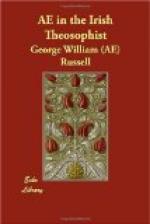“What is it?” said Laeg. Then he also looked and started. “Gods!” he murmured. “Emer! I would rather face a tempest of Formorian enchanters.”
“Do you not see?” repeated Fand scornfully. “It is Emer the daughter of Forgall. Has she also become one of the Sidhe that she journeys thus?”
“She comes in dream,” said Laeg.
“Why do you intrude upon our seclusion here? You know my anger is no slight thing,” broke out Cuchullain, in ready wrath hiding his confusion. The shadow of Emer turned, throwing back the long, fair hair from her face the better to see him. There was no dread on it, but only outraged womanly dignity. She spake and her voice seemed to flow from a passionate heart far away brooding in sorrowful loneliness.
“Why do I come? Has thou not degraded me before all the maidens of Eri by forsaking me for a woman of the Sidhe without a cause? You ask why I come when every one of the Ultonians looks at me in questioning doubt and wonder! But I see you have found a more beautiful partner.”
“We came hither, Laeg and I, to learn the lore of the Sidhe. Why should you not leave me here for a time, Emer? This maiden is of wondrous magical power: she is a princess in her own land, and is as pure and chaste to this hour as you.”
“I see indeed she is more beautiful than I am. That is why you are drawn away. Her face has not grown familiar. Everything that is new or strange you follow. The passing cheeks are ruddier than the pale face which has shared your troubles. What you know is weariness, and you leave it to learn what you do not know. The Ultonians falter while you are absent from duty in battle and council, and I, whom you brought with sweet words when half a child from my home, am left alone. Oh, Cuchullain, beloved, I was once dear to thee, and if today or tomorrow were our first meeting I should be so again.”
A torrent of self-reproach and returning love overwhelmed him. “I swear to you,” he said brokenly, through fast-flowing tears, “you are immortally dear to me, Emer.”
“Then you leave me,” burst forth Fand, rising to her full height, her dark, bright eyes filled with a sudden fire, an image of mystic indignation and shame.
“If indeed,” said Emer softly, “joy and love and beauty are more among the Sidhe than where we dwell in Eri, then it were better for thee to remain.”
“No, he shall not now,” said Fand passionately. “It is I whom he shall leave. I long foresaw this moment, but ran against fate like a child. Go, warrior, Cu; tear this love out of thy heart as I out of mine. Go, Laeg, I will not forget thee. Thou alone hast thought about these things truly. But now—I cannot speak.” She flung herself upon the couch in the dark shadow and hid her face away from them.
The pale phantom wavered and faded away, going to one who awoke from sleep with a happiness she could not understand. Cuchullain and Laeg passed out silently into the night. At the door of the dun a voice they knew not spake:




